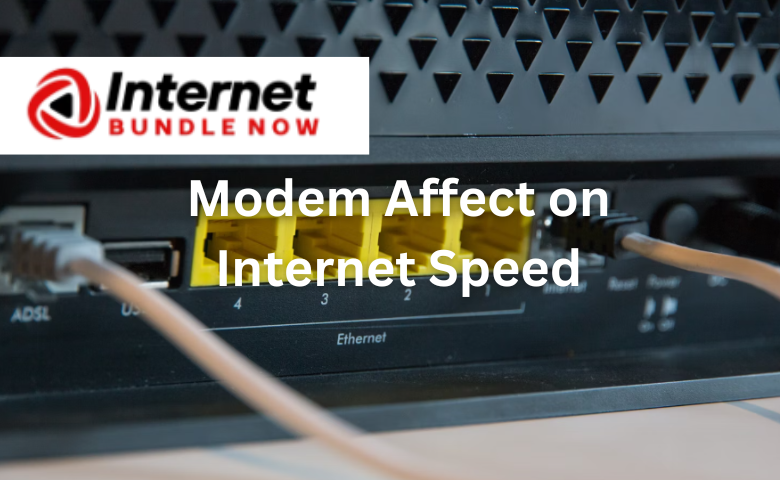- TV
How to Get Premium Channels with Your Cable TV Bundle?
Access to exclusive entertainment content is a priority for many viewers seeking a richer television experience. Premium chan...
Explore More
When it comes to getting the most out of your internet connection, the modem you use plays a crucial role. Many people overlook this small but mighty device, focusing instead on their internet service provider (ISP) or their Wi-Fi router. However, your modem is the gateway between your home network and the wider internet, and it can significantly impact your internet speed. In this blog post, we'll explore how modems affect internet speed, why they do so, and what steps you can take to ensure your modem isn't holding you back.
The responsibility of modems are converting the digital signals from your ISP into the data your devices can use. The quality and capabilities of your modem directly influence how efficiently it can handle this task. Here are a few key factors in which a modem can affect your internet speed:
Modem Technology and Standards: Modems come in different standards, with each new standard offering improvements in speed and efficiency. For example, older modems using the DOCSIS 2.0 standard can only handle a fraction of the speeds that newer DOCSIS 3.0 or DOCSIS 3.1 modems can manage. If you're using an outdated modem, it might not be capable of supporting the maximum speeds offered by your ISP.
Channel Bonding: Modern modems use a technique called channel bonding, which combines multiple channels to increase overall bandwidth. DOCSIS 3.0 modems can bond up to 32 downstream channels and 8 upstream channels, significantly enhancing your internet speed. In contrast, older models with fewer channels available for bonding will deliver lower speeds.
Firmware and Hardware Limitations: Just like any other piece of technology, modems rely on both hardware and software. Older modems may not only have less powerful hardware but might also lack firmware updates that can improve performance or security. Outdated firmware can lead to inefficiencies and slower data processing, impacting your overall internet speed.
Different types of internet connections interact with modems in various ways:
Cable Internet: Cable internet performance depends significantly on a modem's capacity to manage multiple channels. If your modem can't bond a sufficient number of channels, it won't be able to maximize the full speed potential of your connection.
DSL Internet: For DSL connections, it is vital that your modem is compatible with your ISP's infrastructure. An older DSL modem might not be able to handle the higher speeds provided by recent network upgrades from your ISP.
Fiber Optic Internet: Although fiber optic connections often use a modem/router combination (called an ONT - Optical Network Terminal), having an outdated ONT can still restrict the speeds you receive.
How can you tell if your modem is affecting your internet speed? Here are a few signs:
Consistently Slow Speeds: If you’re consistently getting slower speeds than what you’re paying for, even after troubleshooting with your ISP, your modem might be the bottleneck.
Frequent Disconnects: An aging or malfunctioning modem can lead to frequent internet disconnects or dropped connections, disrupting your online activities.
Poor Performance During Peak Hours: If you notice a substantial decline in internet speed during high-usage periods, it could indicate that your modem is struggling to manage the increased traffic effectively.
To ensure your modem isn’t the weak link in your internet setup, consider the following steps:
Check Compatibility: Make sure your modem is compatible with your ISP and can handle the speed tier you're subscribed to. Many ISPs provide a list of recommended modems that are optimized for their services.
Upgrade to a Newer Model: If your modem is several years old, it might be time for an upgrade. Investing in a DOCSIS 3.1 modem, for example, can future-proof your setup and handle gigabit speeds if they’re available in your area.
Regular Firmware Updates: Make sure your modem’s firmware is up-to-date. Most modern modems can be updated automatically by the ISP, but it’s worth checking the manufacturer's website for any available updates.
Optimize Your Network Setup: Place your modem in a central, unobstructed area, away from walls and other electronic devices. This positioning can enhance its efficiency and boost your network's overall performance.
Consult Your ISP: If you’re unsure about whether your modem is affecting your speed, reach out to your ISP. They can perform diagnostics remotely and recommend whether a new modem would be beneficial.
Internet Bundle Now can help you if you have any query regarding your internet. Your modem is essential to your internet setup, and using an outdated or incompatible model can greatly impact your internet speed. By understanding how modems function and proactively ensuring yours is suitable, you can achieve a faster, more reliable connection. Whether it's upgrading to a newer model, keeping the firmware current, or consulting with your ISP, small adjustments can significantly enhance your internet experience. Don’t let an old modem hold you back—invest in the right technology to enjoy the speeds you deserve.
Latest insights, tips, and updates from our experts.
Admin
Does Modem Affect Internet Speed in USA? Impact and Solutions